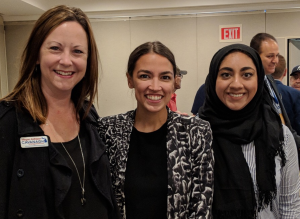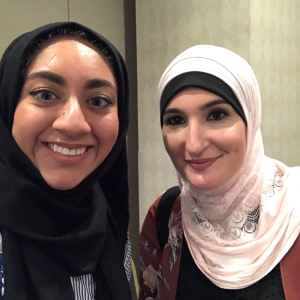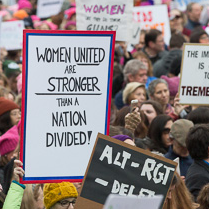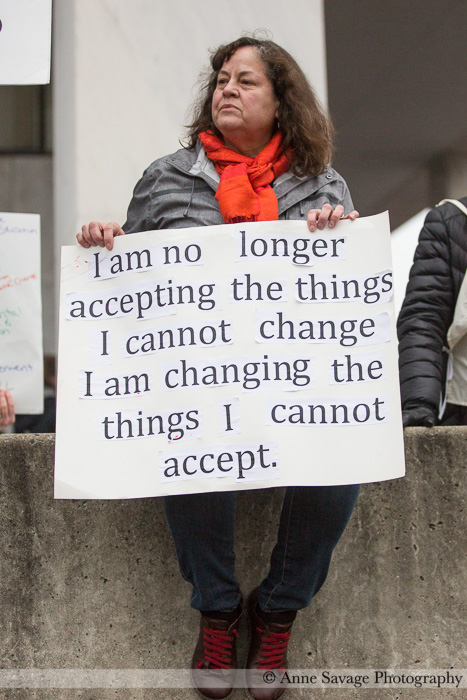 When I met Alexandria Ocasio-Cortez in Dearborn this weekend, she shared her experience running around Michigan in support of Abdul El-Sayed for Governor. When I asked her which city was her favorite, she said that Flint had a special place in her heart because she visited the area when she took a trip to the Midwest after the 2016 elections. In fact, witnessing the suffering in Flint inspired her to run for Congress against Joe Crowley in New York. And when Bronx native Ocasio-Cortez spoke to the audience, she was very soft and passionate, and her gesticulations exhibited a desire to collectively uplift the people around her.
When I met Alexandria Ocasio-Cortez in Dearborn this weekend, she shared her experience running around Michigan in support of Abdul El-Sayed for Governor. When I asked her which city was her favorite, she said that Flint had a special place in her heart because she visited the area when she took a trip to the Midwest after the 2016 elections. In fact, witnessing the suffering in Flint inspired her to run for Congress against Joe Crowley in New York. And when Bronx native Ocasio-Cortez spoke to the audience, she was very soft and passionate, and her gesticulations exhibited a desire to collectively uplift the people around her.
 Then Linda Sarsour walked into the room, purposefully. She speaks with power, she is straightforward, unapologetic, and unafraid to say what she believes. The Brooklyn accent shines through, and she’ll take every opportunity to remind you that she is a hijabi Muslim American who is tired of the establishment. As co-chair of the Women’s March and a seasoned political activist, she is a strong advocate for marginalized folk; she doesn’t have time for haters.
Then Linda Sarsour walked into the room, purposefully. She speaks with power, she is straightforward, unapologetic, and unafraid to say what she believes. The Brooklyn accent shines through, and she’ll take every opportunity to remind you that she is a hijabi Muslim American who is tired of the establishment. As co-chair of the Women’s March and a seasoned political activist, she is a strong advocate for marginalized folk; she doesn’t have time for haters.
What struck me about these two women was that, despite their polarized personalities, it was no coincidence that they were touring Michigan together. They were both proud of their identities and of the communities that raised them. They both believed that people should not support candidates only because they were more likely to win; we have to start prioritizing values and empowering Americans to change the current political landscape. Those values include the $15 minimum wage, healthcare for all, progressive education policies, equal pay, and gun reform. More specifically, hardworking women and women of color are going to be the face of the Democratic party and progressive platform in 2018 and beyond. Democrats should not be afraid to fight for the policies that they have wanted forever because they feel that it’s “not their time” and because they have to “wait their turn”. They don’t appear to care about the fact that the odds seemed to stack up against them.
We can absolutely debate what it means to be progressive, and we can also argue what policies fall within that niche. We don’t even have to all vote for the same candidates. What is certain, however, is that women are finally taking charge. The proof is in what Linda Sarsour said when introducing leaders of minority organizations at the #MyMuslimVote rally who were all women: Let’s not kid ourselves, the women are the ones taking charge and doing all the great work. We are seeing a formidable increase in the number of women running for office and becoming politically active across the country. In Michigan alone, there are currently 19 women running for U.S. House, and over 200 running for state House and Senate, not to mention the other seats. Moreover, there are many more talented women staffers, volunteers, and interns working on various campaigns for the 2018 midterms. Future election cycles will rely heavily on the talents of these women who, by then, will be seasoned campaigners and champions of justice if they aren’t already.
 Before we continue: If any of you are questioning women’s intentions or capabilities, just remember that women don’t want to be elected into office or impact policy solely on the basis of their identity. Haley Stevens, candidate for 11th Congressional District says that “while we need more women in politics and there are so many great women in politics running this year, all the women I know who are running aren’t just running because they are women, they are women with ideas, experience and things to afford their government. Let’s elect more experienced, exciting women to office. Let’s give more women a seat at the table because they have something to offer”. Women who are genuine, intelligent, and skilled within their particular field don’t deserve to be undermined. The idea is to get the right women into office, not just any women.
Before we continue: If any of you are questioning women’s intentions or capabilities, just remember that women don’t want to be elected into office or impact policy solely on the basis of their identity. Haley Stevens, candidate for 11th Congressional District says that “while we need more women in politics and there are so many great women in politics running this year, all the women I know who are running aren’t just running because they are women, they are women with ideas, experience and things to afford their government. Let’s elect more experienced, exciting women to office. Let’s give more women a seat at the table because they have something to offer”. Women who are genuine, intelligent, and skilled within their particular field don’t deserve to be undermined. The idea is to get the right women into office, not just any women.
The question arises: If women are doing everything, then hasn’t inequality been solved? No. Despite everything they have achieved thus far, sexism, harassment, and discrimination are alive and rampant.
Just because more women are involved, it does not mean that all the problems women face are immediately wiped away. Candidate for State Representative in District 35, Katie Reiter argues that “women are still held to a higher standard of behavior. There is a perception of women being weaker – less ‘strong’ on issues and more emotional…It’s a lose/lose situation for us and it’s difficult to overcome.”
We need women on all levels making decisions in order for real change to come. The energy women have to spend on convincing people that they can do just as well as their male colleagues is energy that could have been spent on getting the job done. Megan Cavanagh, appellate attorney and candidate for Michigan Supreme Court, stated that “with respect to campaigning, [she has] been somewhat surprised by the number of instances where men have felt free to offer unsolicited advice on various aspects of [her] campaign and campaign strategy”. She had similar experiences during her time as an engineer and a lawyer, where men would ask her to do administrative work even though she was in equal standing with other male lawyers.
Let’s also not forget sexual harassment or sexually charged comments, which are commonplace. Take the example of Marisa Kanof, alum of the Obama 2012 and Clinton 2016 campaigns: “In 2016 during a particularly tense staff meeting, a senior male member of the staff told me smile. There is NO way he would have said that to a man. I was pissed, but knew I had to keep my cool because my behavior would be the one called into question if I made a big deal about it”. And in the end, she was told that she would have to deal with it, as opposed to her higher ups speaking with the rude staff member. I have personal experiences with this sort of inappropriate behavior as well. I remember when I was a field organizer for Clinton in 2016 and one of my male volunteers became obsessed with me. He kept questioning why I couldn’t be with him since I was single. I got my Regional Field Director to prevent him showing up at our staging location two days before election day.
Another major problem that we need to tackle is that female voters, campaign staff, and candidates are often tokenized, especially women of color. Mari Manoogian who is running for State Rep in the 40th District made a valuable point: “Being a woman is an asset. I wish people understood that it’s important to not treat women as though we are a minority of voters, or that we are a demographic group to pander to when it is election time”. Moreover, Nour Ali, the brilliant 19-year old Finance Assistant to Fayrouz Saad’s congressional campaign, says: “I am not here for you to fulfill some status quo or so that you can show to your constituents that you are diverse and inclusive”. Women, and women of color in particular, know what it feels like for people to reach out to you only when they need your votes or when they need to check a box. That should be unacceptable in this day and age, but even the Democratic Party is guilty of this. The Party loves to uplift a few people of color just because of their identity, but then also pushes them down because their name sounds too foreign, or because they aren’t “electable”, whatever that means. And minorities are tired.
Moreover, our political climate and campaign styles are not inclusive to or understanding of women’s needs. For instance, candidate Rashida Tlaib for Congress in the 13th Congressional District gets a salary from her campaign because she is a single mom and has to afford to live. There was definitely backlash, with people claiming she was misusing funds. It exemplifies what Nicole Breadon who is running for State Rep in the 43rd District says: “What I would like people to understand about being a woman in politics is that many of us are moms and so we already have full time jobs raising children”. Wouldn’t it be great if we also allowed women to be themselves while running for office? And giving them the tools to reach out to people without sacrificing their personal lives in the way that men don’t have to worry about?
Evidently these are only some of the problems that women face. Young women may not even want to enter the field of politics (or any field for that matter) when they hear that male elected officials have sexually harassed their female colleagues, or that women are constantly interrupted or shut down on the job. It is also disheartening that most politicians in senior positions are older white men; there seems to be little room for female representation in government. But what’s important to remember is that women have started flocking to the ballot boxes and campaign offices because they recognize that they are the only ones who can truly take charge and solve these problems. It’s not just about getting people to understanding our grievances and hoping that they will listen. It’s about taking matters into our own hands because we don’t want to wait around anymore.
So for women who are unsure about whether they want to be at the forefront of this progressive movement or afraid of the ramifications of being involved, Fayrouz Saad, candidate for the 11th Congressional District isn’t gonna have it: “We have to be assertive about our right to be in the room where decisions are being made. We don’t all get a seat at the table automatically. But if you’re persistent, and refuse to let your voice be ignored, you can be an effective advocate for yourself and your priorities. And it’s more crucial now than ever. Like I always say: ‘If you’re not at the table, you’re on the menu.'”. We don’t want our society to be eating us up.
While it’s all up to us, we should also take comfort in the fact that many women like the ones in this article are going through these struggles, and they have never let that deter them from contributing to society. In fact, being part of a larger sisterhood of political engagement is what keeps many women motivated to begin with. Kate Borninski who is the President of the Plymouth-Canton Community Schools Board of Education says that her “favorite part about being a woman working in politics is the sisterhood [she has] built with other women in politics. [She loves] talking to and commiserating with other strong women”.
This truth also translates to political activists, not just campaigners, candidates, and elected officials. Adrienne Pickett, a new activist who is active in Indivisible and Forward Action Michigan, says, “Most people have been really supportive and encouraging. Even my conservative family members have said, hey, good for you”. These women who have found circles of support will ultimately go on to become serious mentors for emerging women. They will help them navigate the complexities of taking the world by storm.
 One example is Kristina Lodovisi, candidate for Senate in District 9 and Girl Scout Troop Leader. She mentions: “My favorite part of being a candidate for State Senate is that I can say that I put myself out there to make a change and I am helping to pave the way for more future women in politics.” We can look up to Kristina and other women as examples for reform and, hopefully, thanks to them, women will not have to work as hard to achieve equality in the future.
One example is Kristina Lodovisi, candidate for Senate in District 9 and Girl Scout Troop Leader. She mentions: “My favorite part of being a candidate for State Senate is that I can say that I put myself out there to make a change and I am helping to pave the way for more future women in politics.” We can look up to Kristina and other women as examples for reform and, hopefully, thanks to them, women will not have to work as hard to achieve equality in the future.
Meeting women like Linda Sarsour and Alexandria Ocasio-Cortez proved to me that anything is possible, if women are willing to support each other and put the work in. It’s not just about supporting women in your district, or even in Michigan. It’s about a national progressive movement that is built on the premise that women are capable of influencing society in a positive way and that they deserve to be part of the changes that directly impact them. I can’t believe I have to say that because it’s so obvious, but here we are. So, if for some reason you’re waiting to make a difference, don’t! Our country has made serious progress over the decades, but we are nowhere near where we need to be. If you’ve never been politically involved, take the time to learn about the election dates and promise that you’ll get a couple of people to go with you to the polls. Join a campaign by volunteering or donate some money. There’s no better time than 2018.



